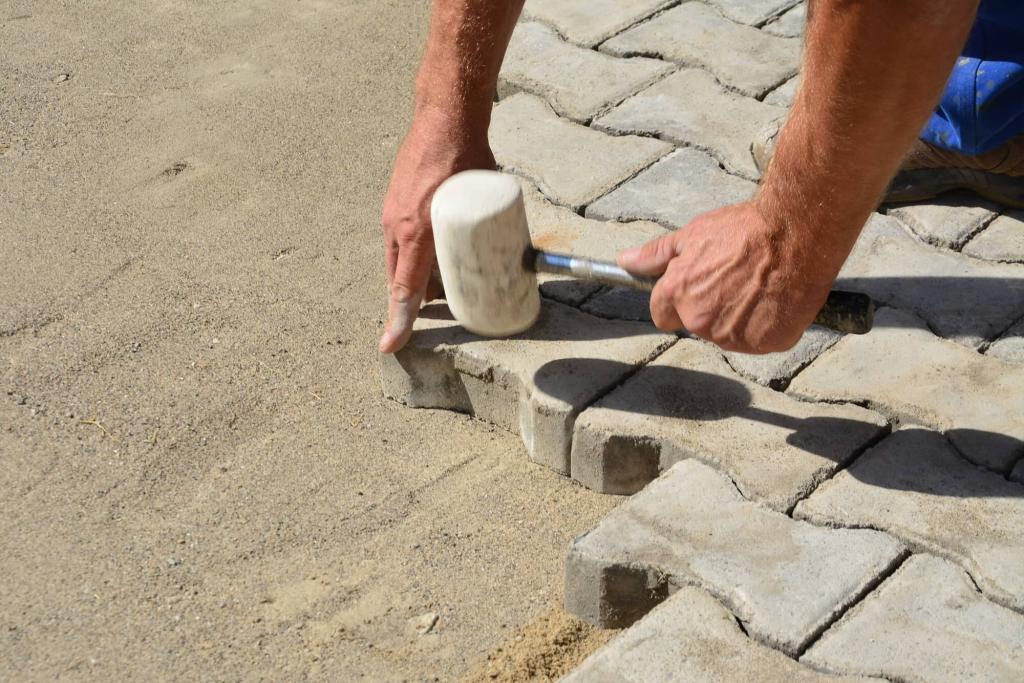
After deciding that you’re ready for your next outdoor project, you might be wondering about permeable pavers. More and more people are deciding to use these for their driveways and patios.
Permeable pavers are also known as permeable interlocking concrete pavements (PICP). This paving system is environmentally friendly as it is great for reducing runoff and minimizing the risk of flooding. The design lets rainwater trickle through cracks between the paver stones. This is so that water can seep into the ground (instead of pooling on top of the surface).
There are also lots of colors, shapes, and sizes to choose from. Not to mention that the way you lay them can create visually appealing patterns to complement your home or outdoor living space. So how do you decide which permeable paver is best for your project? Well, first let’s take a look at the different types and what they’re most suitable for.
Types of Permeable Paving
Interlocking Permeable Pavers
If you want to create beautiful outdoor living spaces or a sleek new driveway, interlocking permeable pavers are an excellent choice.
This type of paving involves placing paver stones in a way that allows for joints or cracks between them. These cracks allow water to seep through into the ground below so that you don’t experience flooding or excessive runoff.
Interlocking permeable pavers can also be placed in a variety of ways and come in many different styles. So, you can create the perfect driveway or outdoor space to suit your needs. From old-fashioned cobbled pathways and charming, stepping-stone styles to more classic, modern cuts, and luxurious natural stone finishes, interlocking pavers are incredibly versatile.
Permeable Concrete Or Asphalt
Permeable concrete is made when concrete and stone are mixed together and laid without a sand or gravel sub-base. This makes it more porous so that water can slowly seep into the ground, rather than pool or result in a lot of runoff.
Aesthetically speaking, this type of paver looks less refined than traditional concrete or interlocking pavers. Thus, it might be more suitable for commercial use rather than residential.
Aside from being somewhat expensive to install, permeable concrete has some other disadvantages. It’s important to note that it has limited water drainage capability, needs regular maintenance, and is not very durable.
Plastic Paving Options
Many people are starting to turn to plastic paving solutions due to their heightened permeability. Plastic paving grids are excellent for commercial and industrial use as they can withstand heavy truck traffic. This type of paving is filled with gravel or grass – making it extremely permeable.
Things To Consider When Choosing Permeable Pavers
Budget
Of course, budget is one of the first things you need to consider. Some of the materials for your permeable paver needs may be more expensive than others. If you are set on a specific type of stone, you may need a bit of planning to purchase materials at a later date and time. Unless you’re a DIY expert, there is also the matter of the installation to think about.
Design
Design is another important aspect to consider. Whether you are looking for a nostalgic, cobbled design, a more modern, square-cut stone with a geometric layout, or a textured paving surface in multiple colors, there are many options to choose between.
Thus, there are several design factors that you need to think about. These include the color you want, the shape of the paver stones, and how you want them laid out.
If you’re not completely sure what would best suit your project needs, it’s always best to reach out to an interlocking paver expert for some advice. We, at Buddha Builders, are always happy to help!
Why Choose Permeable Pavers?
When stormwater has nowhere to go, it has to wait for the evaporative powers of a hot day or find its way towards permeable areas and sewer systems.
Aside from being a timely consideration, this aspect can cause flooding. As stormwater runs through streets and drains, it can also become contaminated and affect the groundwater quality when it finally sinks in.
Permeable pavers remove these obstacles by providing a more effective means of runoff reduction. With permeable joints or cracks, these pavers allow water to seep through into the ground below. They are a more environmentally friendly solution that reduces runoff. In turn, this regulates stormwater, reduces the risk of flooding, and helps to protect natural waterways.
Apart from being more eco-friendly, interlocking permeable pavers can help you to create the outdoor living space or driveway of your dreams with visually appealing patterns and styles.
Find Out More About Which Permeable Paver Is Best For You
Still have questions about finding the right permeable paver? Get in touch with Buddha Builders today and we can assist you with a quote as well as attend to all your interlocking permeable paver needs.